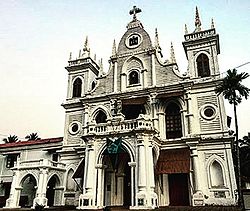Siolim
|
Siolim Xivoli |
|
|---|---|
| Town | |

São António Igreja
|
|
| Coordinates: 15°36′52″N 73°46′14″E / 15.614537°N 73.770447°ECoordinates: 15°36′52″N 73°46′14″E / 15.614537°N 73.770447°E | |
| Country |
|
| State | Goa |
| District | North Goa |
| Taluka | Bardez |
| Named for | "Xinv" means Lion and "Halli" refers to a Village |
| Government | |
| • Type | 3 Panchayats |
| Elevation | 8 m (26 ft) |
| Population (2001) | |
| • Total | 10,311 |
| Demonym(s) | Xivolkar or Siolcar |
| Languages | |
| • Official | Konkani |
| • Also Spoken (understood) | English |
| • Historical | Portuguese |
| Religions | |
| • Dominant | Roman Catholicism, Hinduism |
| Time zone | IST (UTC+5:30) |
| Postcode | 403 517 |
| Telephone code | 0832 227 |
| Vehicle registration | GA |
| Website | goa |
Siolim ([ʃiwoːlĩː]) is a village in Bardez taluka, and a census town on the central west coast of India, in the North Goa district of Goa. The 2001 population was 10,311. Siolim is also the name of a constituency in the Goa assembly, which includes Assagao, Anjuna and Oxel, in addition to Siolim. This article is about the village of Siolim. A person from Siolim is known as a Siolcar (Konkani: Xivolkar).
Siolim is situated about 7 km (4.3 mi) from Mapusa. It is located around Chapora River. There is a bridge over River Chapora, in place of the prior ferry.
To Siolim's north lies the quiet village of Oxel; green hillocks hedge it towards Assagao in the south and the east. Camurlim too lies to its east, and in the west flows the Chapora river with Morjim and its pine-wooded beach on the northern bank in Pernem.
Siolim, has several different types of sub-divisions, whom are independent of one another. They include:
There are 9 vadde: Igrez-Vaddo, Gaunsa-Vaddo, Bamon-Vaddo, Marna, Porta-Vaddo, Tarchi Bhatt, Guddem, Aframent, Vaddi and Oxel.
There are three panchayats: Siolim-Marna, Siolim-Sodiem, and Siolim-Oxel.
There are 2 comunidades: Siolim and Marna.
There are 3 parishes: Siolim, Oxel and Tropa.
The name "Siolim" comes from two words: 'Xinv' and 'Halli' . "Xinv" (pronounced 'Shiu') means "lion" and "Halli" refers to a village or place. This probably means that there once were plenty of lions in the hills of Siolim. This origin of the name has been documented in Fr. M. De Souza's book. An argument in favour of this origin is that the village on the other side of the Siolim (not Marna) hill is called Vagali, which could be 'Vag' + 'Halli' ("Vag" means "tiger"). Another explanation is that the name comes from 'Shivalaya' , which means a temple of Shiva, but there is no documented evidence for this origin.
...
Wikipedia


